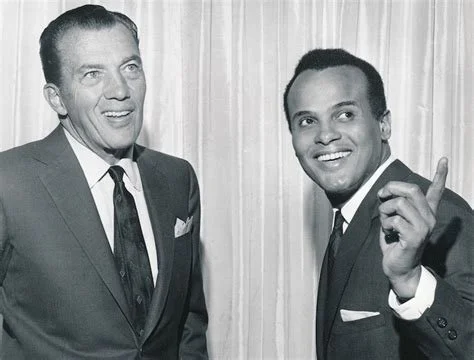Ed Sullivan - A star of the Irish Diaspora
Set aside your preconceptions about Ed Sullivan - that he was a lightweight host who just happened to introduce the Beatles to America and tried to censor rock and roll.
Ed Sullivan was more than you thought. A lot more. He wasn’t just the stiff, no-nonsense, pioneer television variety show host who ushered Elvis and the Beatles into our front rooms where the one tv set the whole family watched was located.
Screen time then meant watching one of the shows the three networks or the oddball local independent station was offering. On Sunday nights in the 1950s and first half of the 1960s that show was The Ed Sullivan Show.
Twenty three years. Eleven hundred episodes. Ten thousand acts. All cleared by Ed Sullivan himself.
As the ranks of those who watched religiously are thinned out by time, Ed Sullivan has returned in a Netflix documentary called Sunday Best - The Untold Story of Ed Sullivan.
Ed Sullivan was a classic Irish Catholic diaspora success story
His father held a Tammany Hall-sanctioned post at the Customs House in New York City at the turn of the century. He was one of seven kids (a twin brother died at two) raised in Harlem and educated in Catholic schools. His show was where we first saw Irish song and dance come alive. (More on that Tuesday.)
But that’s not what Sunday Best is about. This Untold Story is about how Ed Sullivan stood up to CBS when the network tried to stop him from booking Black acts. Authorized by his heirs, the documentary makes the case that were it not for Ed Sullivan, some of the greatest acts of the twentieth century would have been denied an audience of millions of Americans. Including you and me. Louis Armstrong. James Brown. Ella Fitzgerald. Richard Pryor. Ray Charles. Stevie Wonder. Smokey Robinson. Flip Wilson. Pearl Bailey. The Supremes. The Four Tops. The Temptations. Moms Mabley. Sammy Davis Jr. Fats Domino. Harry Belafonte.
“For all you youngsters out there….”
Do you wonder who wouldn’t want those Black acts exposed to 40 million American viewers? Southern businessmen. Specifically, Southern car dealers. Their customers boycotted their showrooms if they advertised on the Ed Sullivan Show, they told CBS execs. But Ed Sullivan refused to cool it with the Black acts. How many times he threatened to quit rather than abandon an act is closely held. As is whether he ever caved to pressure. We know from multiple sources that there were acts he didn’t get along with and lyrics he censored. Again, the Untold Story isn’t about that.
He came under tremendous pressure not to book Harry Belafonte because he supported Civil Rights. Sullivan, strong in his Irish Catholic beliefs, was an avowed anti-Communist. Belafonte was suspect in the eyes of many anti-Communist Catholics because he hung out with Martin Luther King Jr. not to mention Pete Seeger and other folkies. When Sullivan found out Belafonte was a Catholic, he at first tried to contact his parish priest. Then, the two men met.
“Everything you suggested is true,” Belafonte told Sullivan after being read a list of his “subversive” activities.
The singer said, “When the Irish did battle with the British, the rebel mood was considered quite heroic by all the Irish citizens in the world. Explain to me what the difference is when those of us of color also strike out against the same oppression. The Irish rebels who do that are heroic. Black rebels who do that are unpatriotic. This is not about loyalty to the nation, this is about loyalty to the human condition.”
Belafonte went back to his office. Two hours later his agent called. “I don’t know what you said to Ed Sullivan but you’re on the show.”
For so many acts, the Ed Sullivan Show was the Cape Canaveral of careers. No way, he said, would he deny Black acts the opportunity. "As a Catholic, it was inevitable that I would despise intolerance, because Catholics suffered more than their share of it. As I grew up, the causes of minorities were part and parcel of me. Negroes and Jews were the minority causes closest at hand. I need no urging to take a plunge in and help." He married a Jewish woman, Sylvia Weinstein, who at first told her parents she was dating Ed Solomon. Their marriage lasted until death did them part.
Ed Sullivan was a high school sports star. When he heard that some kids from Connecticut refused to play against his Port Chester High School team because it included Black players he spoke out. “Some fellows said they would not play against a Negro. I always resented them very deeply because the Irish had gone through that when they first came to America. They were supposed to be lazy, ignorant drunkards. My parents knew these things were wrong. They weren’t broad-minded. They were just sensible.” He became the sports editor of the New York Evening Graphic, a gonzo tabloid that lasted from 1924 to 1932. Before he turned 30 he took a stand in print against NYU for benching a Black player when the University of Georgia came to town.
He was moved to Broadway Editor and never looked back but never forgot either.
Before hositng the Ed Sullivan Show, he was Sports Editor of the New York Evening Gaphic. Walter Winchell worked there too.




